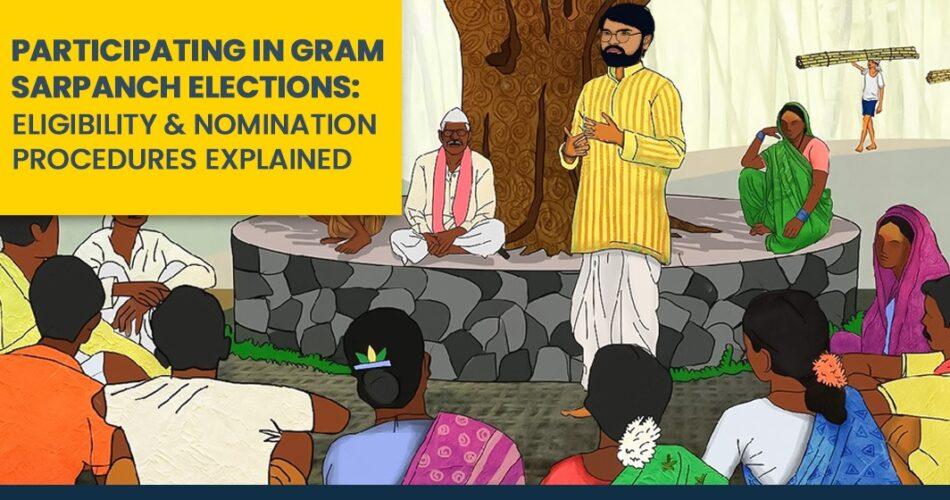Learn about the eligibility criteria and nomination procedures for Gram Sarpanch Elections in rural India. This blog also covers the roles and responsibilities of a Gram Sarpanch, recent trends in Gram Sarpanch Elections, and effective campaigning strategies. Don’t miss out on the opportunity to contribute to the development of your village.
Introduction
Elections are the backbone of democracy. They provide a platform for the citizens to participate in the governance of their country, state or village. One such election that holds great importance in rural India is the Gram Sarpanch Election. In this blog, we will discuss the eligibility criteria and nomination procedures for the Gram Sarpanch Elections. We will also take a look at some relevant examples from recent Indian politics.
Eligibility Criteria for Gram Sarpanch Elections
To contest the Gram Sarpanch elections, the following eligibility criteria must be fulfilled:
Age: The candidate must be at least 21 years of age.
Education: The candidate must have passed 10th standard or equivalent from a recognized board.
Citizenship: The candidate must be an Indian citizen and must be a resident of the village where he/she is contesting from.
Criminal Records: The candidate must not have any criminal record and must not have been convicted of any offence.
Nomination Procedures for Gram Sarpanch Elections
The nomination process for Gram Sarpanch Elections is a straightforward one. The candidate must file a nomination form with the designated authority. The nomination form must be duly filled and submitted along with a deposit of Rs. 500/- for general category and Rs. 250/- for reserved category candidates. The nomination form must also be accompanied by an affidavit stating that the candidate fulfils all the eligibility criteria mentioned above.
Once the nomination form is submitted, the authorities will scrutinise the form to ensure that all the necessary documents are in place. After the scrutiny process, the list of valid candidates will be published, and the election campaign can begin.
Roles and Responsibilities of a Gram Sarpanch
Once a candidate is elected as a Gram Sarpanch, then he/she has several important roles and responsibilities. These responsibilities are aimed at improving the living standards of the residents of the village. Some of the key responsibilities of a Gram Sarpanch are as follows:
Implementation of Government Schemes: The Gram Sarpanch is responsible for implementing various government schemes that are aimed at the development of the village. This includes schemes related to education, health, sanitation, and rural development.
Maintenance of Records: The Gram Sarpanch is responsible for maintaining all the records related to the village. This includes records related to birth and death certificates, land records, and property tax records.
Resolution of Disputes: The Gram Sarpanch is responsible for resolving disputes that arise in the village. This includes disputes related to property, land, and other issues that may arise between the residents of the village.
Maintenance of Village Infrastructure: The Gram Sarpanch is responsible for maintaining the infrastructure of the village. This includes roads, bridges, water supply, and electricity supply.
Financial Management: The Gram Sarpanch is responsible for managing the finances of the village. This includes preparing the budget and ensuring that the funds are utilised effectively.
Recent Trends in Gram Sarpanch Elections
The voting process for Gram Sarpanch Elections is similar to that of other elections in India. The voting is conducted using Electronic Voting Machines (EVMs) or ballot papers, depending on the availability of resources. It is essential to ensure that all eligible voters participate in the election to ensure a fair and transparent election.
In recent years, there have been several significant changes in Gram Sarpanch Elections. One of the most notable changes is the increasing participation of women candidates. The government has taken several initiatives to encourage women to participate in Gram Panchayat elections, such as reserving one-third of the seats for women.
Another significant change is the use of social media for campaigning. With the increasing use of social media platforms like Facebook, Twitter, and WhatsApp, candidates are using these platforms to reach out to voters and promote their agenda. Social media has proved to be an effective tool for engaging with the younger generation of voters.
Campaigning Strategies
Once the nomination process is completed, candidates need to campaign to win the election. The election campaign is a critical aspect of the election process, and candidates need to use various strategies to reach out to voters. Some of the popular campaigning strategies used in Gram Sarpanch elections are:
Door-to-Door Campaigning: Candidates visit the homes of the voters and explain their agenda and seek their support.
Social Media Campaigning: Candidates use social media platforms to connect with voters and promote their agenda.
Organising Rallies: Candidates organise rallies and public meetings to reach out to a larger audience.
Conclusion
Participating in Gram Sarpanch Elections is an excellent opportunity for individuals to contribute to the development of their village. However, it is essential to understand the eligibility criteria and nomination procedures before contesting the election. It is also crucial to understand the roles and responsibilities of a Gram Sarpanch and the importance of voter participation. By following the correct procedures and adopting effective campaigning strategies, candidates can make a positive impact on the development of their village.
And in the modern era of digitalization, what else could be better than social media marketing? Partner with Political Engineer for a winning campaign in the Gram Sarpanch Elections. Let us create a compelling digital identity for you and help you connect with voters on social media like never before. Trust us to deliver results and make your campaign a success. Contact us now to get started!

Follow us for more updates on Facebook
Get more interesting stuff on our official portal. Visit us on:
https://www.politicalengineer.in

